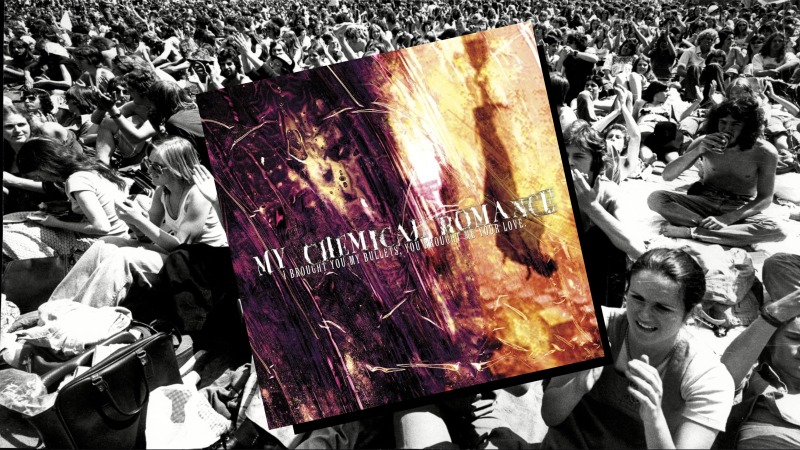Time Capsule: My Chemical Romance, I Brought You My Bullets, You Brought Me Your Love
The decade-defining post-hardcore emo band's debut wasn't nearly as immaculate as their iconic sophomore record, Three Cheers for Sweet Revenge, but it showed their early potential as one of the most influential bands to emerge from the Myspace era.

On September 11, 2001, My Chemical Romance frontman Gerard Way witnessed the terrorist attack firsthand from Hoboken. Though he had played guitar in a couple of bands in his teen years, he was focused at the time on being a comic book artist. But after seeing such a senseless tragedy, Gerard knew he had a bigger purpose. He wanted to help others who were struggling with their mental health, and now terrified of what was to come, find light amid the darkness. Shortly after 9/11, Gerard came up with “Skylines and Turnstiles,” the first-ever track written for My Chemical Romance, which is featured in their debut album, I Brought You My Bullets, You Brought Me Your Love.
Like many My Chemical Romance fans, I found Bullets after becoming obsessed with Three Cheers for Sweet Revenge. It’s a record that, despite its imperfections, I look back at fondly, with lyrics from songs like “Honey, This Mirror Isn’t Big Enough for the Two of Us” making their way into my MSN Messenger away messages. While Three Cheers for Sweet Revenge is My Chemical Romance’s strongest album, turning the New Jersey band into stadium-performing emo superstars, Bullets is a record that shows how much promise the band had from the start, leading to them being signed to major label Reprise shortly after its release. In Bullets, Gerard learns to connect his nerdy interests as a horror movie and comic book enthusiast to the rock star realm. The shy, introverted Gerard is nowhere to be found here; instead, he introduces an alluring persona that feels like the lovechild of David Bowie and Glenn Danzig.
My Chemical Romance didn’t start out as a group of seasoned musicians who had it all figured out, but rather as a new creative outlet for Gerard, who roped in his brother Mikey to play bass (an instrument he was still at a beginner level with) and acquaintance Matt Pelissier to play drums (who was replaced following their debut album). Though Gerard was a proficient guitarist, he had Ray Toro, a fixture in the local New Jersey scene, play guitar; meanwhile, Frank Iero, then a member of Pencey Prep, was convinced to join as the rhythm guitarist during the process of recording Bullets, despite his bandmates being practically strangers to him.
The band got signed to Eyeball Records, a label run by their longtime friend Alex Saavedra, who already had My Chemical Romance’s friends, Thursday, on their roster. While Saavedra could see the potential in this new group, Thursday frontman Geoff Rickly wasn’t convinced. “I was like, ‘These guys are fucking hopeless. Nothing good will ever happen for these guys. Like, I love them, I’d want them to do a comic with me someday, but nothing good is ever gonna come from this band,'” Rickly recalled to Chris Payne in his mainstream emo oral history book, Where Are Your Boys Tonight?
Thankfully, My Chemical Romance proved Rickly wrong. After catching the band practice, Rickly advised Gerard, “Don’t go down somebody else’s road. Think about your comic books. Think about characters. Draw yourself as a character. Imagine yourself as a superhero.” Gerard took that advice to heart and thus was born My Chemical Romance’s first album, which Rickly ended up producing. In Bullets, Way finds a way to express himself through characters: vampires, zombies, and other monsters. The band decided to record it just a little over three months after forming. The rush would come to their detriment, with an uneven album that gives glimpses at what was about to become one of the biggest bands in the country, taking emo to the mainstream.
Gerard made his love for horror known with the opening, instrumental track “Romance,” a cover of “Romance Anonimo,” a song used in Dawn of the Dead. Giving it their own spin, My Chemical Romance adds radio static to the flamenco-style acoustic melody, making it sound even more haunting than in the zombie classic. It transitions into the zestful “Honey, This Mirror Isn’t Big Enough For The Two of Us,” with guitar riffs that veer into metal and Gerard’s voice shifting from soft wails to explosive screams. Its energy immediately hooks you with its winning combination of heavy instrumentals with an ultra-catchy, sing-along chorus.
It’s a rare, blatantly personal song, where instead of hiding behind a character, Gerard is being candid about his substance abuse, taking ownership of his decision to go a toxic route while ending a relationship that doesn’t fit with his mistakes, as there is no room for someone else when you’re focused on an easy fix for escapism. While other tracks like “Vampires Will Never Hurt You” and “Demolition Lovers” became fan-favorites, “Honey” was a middle school favorite of mine, and revisiting it as an adult 20 years later, I still feel the euphoric, cathartic, rageful energy it brought me growing up.
-

-

-

-

-

-

-

-

-

-

-

-

-

-

-

-

-

-

-

-

-

-

-

-

-

-

-

-

-

-

-

-

-

-

-

-

-

-

-

-








































